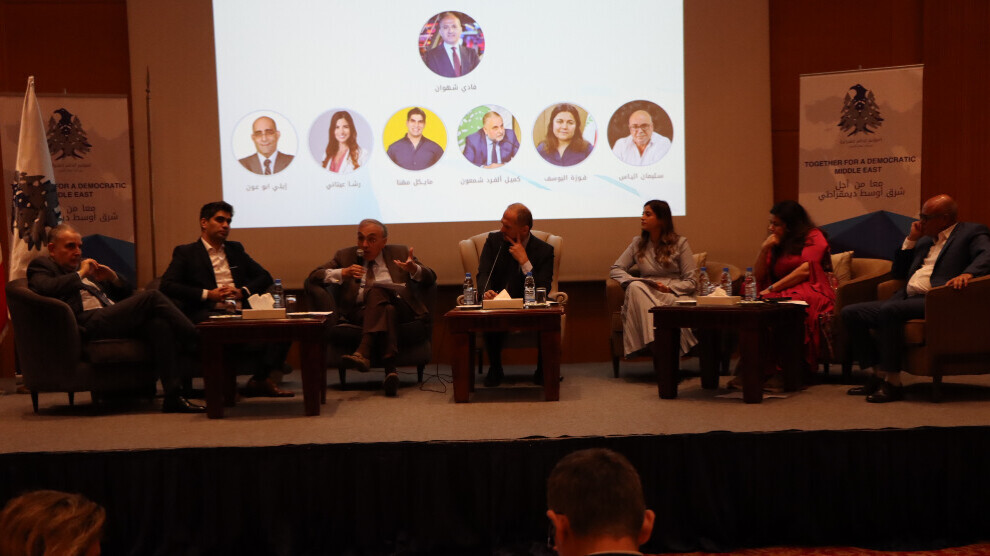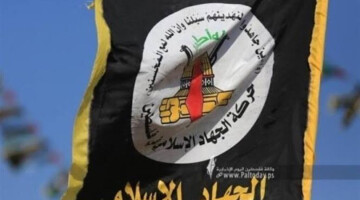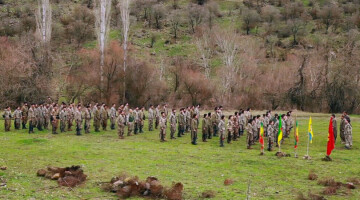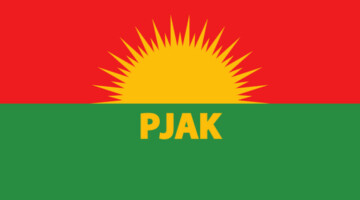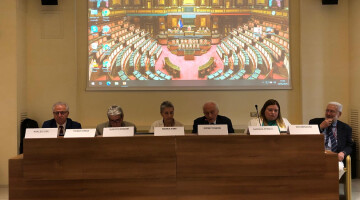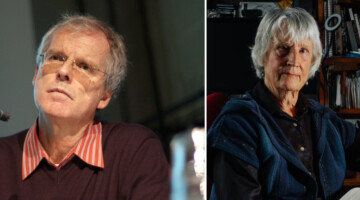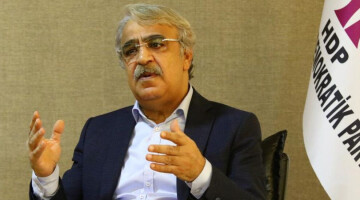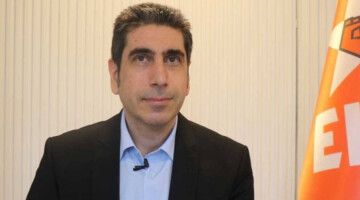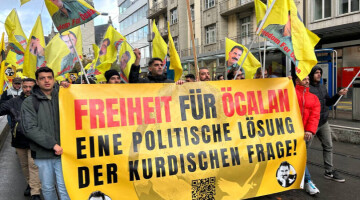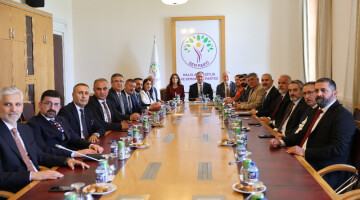A workshop kicked off in Beirut on June 13 to discuss the International Conspiracy against Kurdish leader Öcalan, the global crisis and its effects, the role of a democratic nation and women, and joint working methods for the realization of democratic confederalism in the Middle East.
The workshop is organized under the motto "Road to peace, Together for a democratic Middle East". More than 80 lawyers, politicians and intellectuals from 10 countries in the Middle East and the world, including Lebanon, Iraq, Tunisia, Sudan, Palestine, Jordan, Egypt, South Africa, Iran, Turkey, North and East Syria and Kurdistan are participating in the workshop.
The workshop is organized by the Lebanese Continual Federal Congress, the Newroz Cultural Association and the Multicultural East Platform in cooperation with Demokratia Novu Orao Seclorum and RESILIENT BEIRUT.
Silêman Îlyas, director of the Fırat Research Centre, drew attention to the economic problems in the region in the first session. He underlined that the global regime has entered a crisis in all areas, saying: “The whole world is facing the effects of the economic crisis that started at the end of 2008. The debt crisis in the economies of European countries threatens the European Union. The fate of the dollar is not clear. It lost its value with the economic downturn of the USA.”
Former Lebanese Minister Yûsif Selamê remarked that the Saudi-Iranian agreement led to peace in the Middle East. He said: “There is a blind loyalty in Lebanon. The leaders here entered into a competition for the approval of Western powers and Arab countries. This is an incurable disease and a blow to Lebanese authority.”
Democratic Union Party (PYD) Executive Board member Foza Yûsif underlined that the current administrations in the Middle East had a religious and sexist mentality. In reference to the international conspiracy against Kurdish leader Abdullah Öcalan, Yûsif said: “Those who can lead are targeted, just like leaving a body without a head.”
Kamil Alfred Shamûn, President of the Colourful Oriental Forum, said that the main reason for the conflicts and sectarian problems in the streets of Lebanon was the current government. He said: “For example, if a sports team from a different sect is successful, counter demonstrations begin immediately in Lebanon.”
Referring to the television channels that control the thoughts of people, Lebanese journalist Michael Muhanna said: “These are party channels that control the brains of sectarian citizens. More dangerously, there are religious channels. The news of the parties is religious, as if they dropped out of the sky and no one could deny it. There are also media outlets that make propaganda and broadcast somewhat neutral news. There should be media awareness and individual awareness.”
In the second session titled "Government of the People and Obstacles in front of it" and presided by Nicola Namiq, the International Conspiracy against Öcalan and its causes, the current situation of Öcalan, the torture system in Imrali where Öcalanis held and the struggle to defeat the conspiracy were discussed.
In the second session, Cairo University Political Sciences Lecturer Dr. Ferînaz Etiyê, one of the lawyers of Öcalan, Mazlum Dinç, and South African international law professor Mahmud Batil made presentations.
Dr. Ferînaz Etiyê said that what was interesting in the conspiracy was that the states that contributed to the conspiracy agreed on the abduction of Öcalan and his handover to the Turkish state, despite their ideological differences.
Etiyê underlined that the Turkish state deprived Öcalan of his basic rights, adding: “One of the reasons for Öcalan's abduction was his views. Western countries with racist motives were disturbed by his ideas.”
Remarking that the abduction of Öcalan fuelled tension and racism, Etiyê said: “We see this in northern Syria, Turkey and Iran. The Kurds are attacked and accused of terrorism in these regions. As a result, western states are working to divide the Middle East in cooperation with regional states.”
Etiyê called for the establishment of relations with the Kurds, saying that there are common interests between the Arabs and the Kurds.
Lawyer Mazlum Dinç emphasized that there were many laws that respect human rights in Turkey, but there was hypocrisy when it came to Öcalan and the Kurds.
Dinç pointed out that: “Freedom, peace and equal life are not possible without Öcalan's project. The Turkish state attacked and jailed Öcalan since it regarded his project as a threat. The conspiracy still continues, and has turned into isolation in Imrali where he is held.”
Dinç noted that Öcalan was constantly subjected to disciplinary punishments and his trial was not fair and unlawful, adding that all the five prisoners in Imralı were not allowed to meet with their families and lawyers. He added: “The Turkish state does not allow us to visit İmralı, violating all international laws. The last information we received from Öcalan was more than two and a half years ago. He spoke to his brother in a short phone call, and we have not heard from him since.”
After lawyer Dinç's speech, international law professor Mahmud Batil from South Africa delivered a speech.
Batil said that the existing international laws were brutal and thus there was a need for a federal law and a free system to protect Öcalan and all the oppressed. Batil continued: “We are all responsible for ensuring Öcalan's freedom. We must raise our voices and work together against oppression.”
Batil called for support for the Kurdish leader and all political prisoners.
The workshop will continue with two new sessions and suggestions today. A final declaration will be announced at the end of the workshop.

